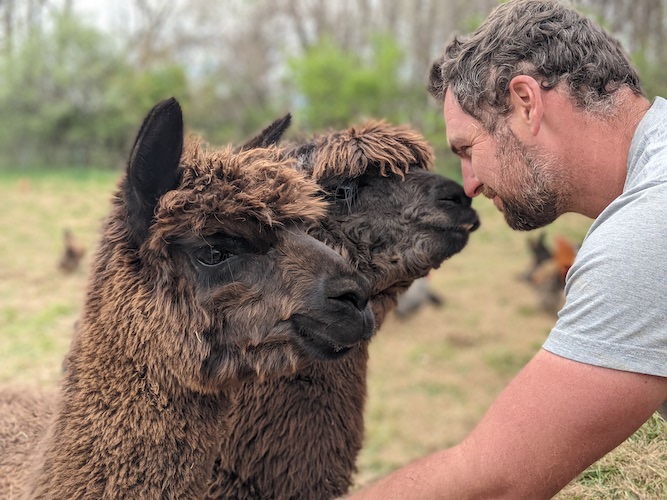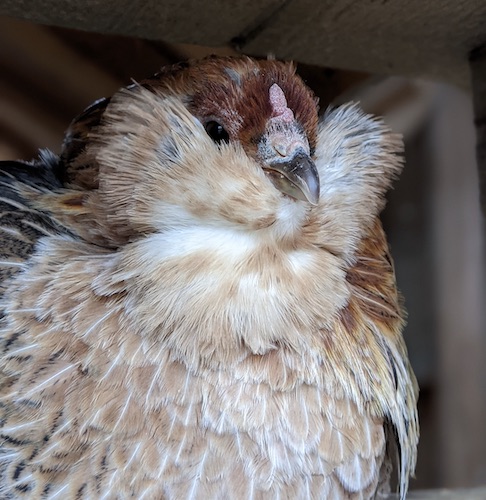Stewards of the Earth
A W&M alumni couple addresses social and environmental challenges through their Maryland farm
October 31, 2022
By
Susannah Perry ’24
For Christy Ottinger ’10 and Connor Horne ’10, an ordinary day on their rural Maryland farm involves any number of tasks, from plant husbandry to maintaining the organic matter in their soil. Other days involve balancing finances or trying to predict what time a storm will start. They might even have to do surgery on one of their chickens. As Christy puts it, “It’s a million different things that are all wrapped up into making this thing happen.”
Their mission at Kitchen Girl Farm is to serve their community through growing a wide variety of fruits and vegetables, and to work every day to improve the environment around them. They offer local delivery and operate a farm share for community members to purchase weekly boxes of vegetables. In addition, they have almost completed construction of their new farm stand.
Before the farm, and before they had even met, Christy and Connor decided on attending W&M for similar reasons. They both grew up in Virginia, and Connor grew up in Williamsburg. Both realized “it just felt like the right place for me” after touring for the first time, citing the intimate size and sense of community it radiated.
At William & Mary, they both pursued degrees in environmental science and policy (ENSP), and Christy also majored in anthropology. They did not start college with particular careers in mind, but rather with a passion for protecting the environment and a desire to take action in whatever way they could. Because of their similar interests, they became friends during their junior year. They were both part of the Student Environmental Action Coalition (SEAC), and they helped start the campus garden. They continued to get to know each other better through their shared activities, and they got married in 2014.
Their classes at William & Mary fostered their curiosity about agriculture and sustainable food farming. They were both inspired by a class former Assistant Biology Professor Eric Engstrom taught called Plants, People and Agriculture that they say “made the big picture of farming click.” As they learned about environmental and social problems in the world, farming felt more and more like a way to address them through a hands-on, tactile approach. Their use of responsible soil conservation and animal husbandry allow them to actively combat climate change, as both practices store carbon long term. Farming also allows for the creation of community spaces and builds bonds between neighbors, countering the isolation people often feel today.
After college, they traveled cross-country, working on a number of different farms, serving immersive apprenticeships and eventually managing a nonprofit urban farm in Baltimore — through which they introduced 15 apprentices of their own to sustainable farming. This wide variety of experiences provided them the training and inspiration for their own farm.
The first farm they established was on leased lots spread far apart, making driving between them difficult. When one of their leases ended, they seriously considered whether they wanted to keep farming, but they decided “there was nothing else in the world we could envision ourselves doing.” They bought land and established Kitchen Girl Farm in Parkton, Maryland. They named their farm after an old fiddle and banjo tune they used to play together as students at William & Mary, a song that represents their roots in Virginia.

Their parcel of land is 8 acres, and they grow vegetables such as broccoli, okra and tomatoes. They also have a flock of chickens and two guardian alpacas. Their goal of improving the environment around them is infused in their sustainable farming and their business practices, whether it be their commitment to practicing regenerative agriculture or the choice to only sell locally.
They strive to be socially conscious, as well, working toward a goal of creating an active community in their area. They are currently renovating a nearly 200-year-old barn on the property that will be used as a community space to host dances and dinners, and they’re building another barn to wash, pack and refrigerate their produce and eggs. Once those are completed, the to-do list still stretches a mile long. It’s hard work, sometimes requiring days where they’re on the go from sunrise to sunset.
One key piece of advice they continue to utilize is “irrigate until it rains” — a warning against trying to predict the future, but rather to be prepared for it and be grateful when things work out in your favor. Christy and Connor also emphasize the importance of a support system, which allows you to fail without the fear that your livelihood will be ruined if you do. They say there is a remarkable community surrounding farming, one which allows small farms to flourish and creates a camaraderie in something that does not always go smoothly. Due to the many unknowns, including extreme changes in weather, they say having support from others who understand the challenges and are willing to lend a helping hand is incredibly valuable.
Farming involves manual labor, long hours, the risk of the harvest not going well or losing an animal — so why do it? The reason is simple: They love their farm. Christy says her favorite parts are “the moments when you’re able to appreciate the beauty of the landscape and the peacefulness of it. We’re in a misty area, which is kind of magical. You hear the animals going to bed, see the sunset or the sunrise … When you can remove yourself from the go-go-go and never-ending to-do list, it’s very easy to feel really grateful for the opportunity that we have to be stewards of that land.”

And that, really, is what it all boils down to. Even with the amount of work that goes into farming, at the end of the day, Christy and Connor have so much love and gratitude for this profession and how it fits into their lives that it always feels worth it. There is often joy to be found, whether it be the odd golf ball being dug up during the harvest, watching their alpacas swim in the water trough or the benevolent ghost that they’ve come to believe haunts one specific creaky beam in the old barn. They get to be with people they love and trust — from their group of six employees, one of whom returned from last season, to each of their parents — all working toward one common goal. They get to meet members of the community, provide employment opportunities and grow beautiful heirloom vegetables.
If they hadn’t been willing to try new experiences in college, there’s a chance they never would have ended up here. The subjects they studied and the clubs they joined allowed them to find their passion, even if the road to it was difficult at times.
Discussing advice they would want to give to their college selves, Christy says, “You never know where any of that is gonna lead. I would have never expected to end up here, with somebody that I met in college. You never, never know. It’s a wild journey, but it’s fun to find the fun in it.”
So, find the fun. (And eat your vegetables).
For more photos of their farm and produce, check out their Instagram account at instagram.com/kitchengirlfarm.